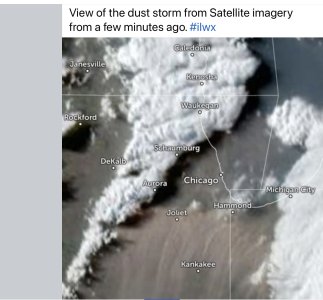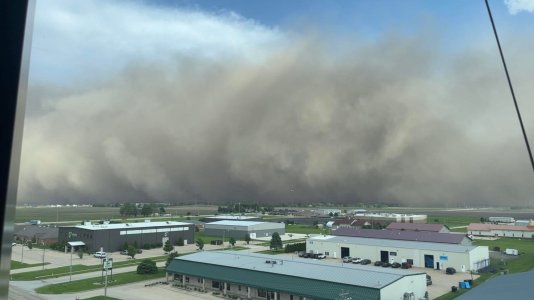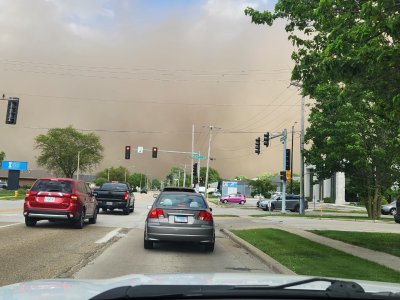You are using an out of date browser. It may not display this or other websites correctly.
You should upgrade or use an alternative browser.
You should upgrade or use an alternative browser.
Dust storms in Illinois.
- Thread starter Westwind
- Start date
Westwind
5 year old buck +
I don’t ever remember having to close interstates in Illinois until a few years ago. I truly don’t know where this soil comes from. I see SO much dirt in the air these days, and I see so many more fields tilled into a beautiful fine powder than I have ever seen before. I suspect some of it is ours not Oklahoma’s.
Last edited:
Howboutthemdawgs
5 year old buck +
Adios topsoil
If a builder pisses on a lot and the runoff goes into a creek it’s a $10k fine. A farmer can work the ground into a fine powder and engulf whole cities and gets a bailout check. Im jealous
If a builder pisses on a lot and the runoff goes into a creek it’s a $10k fine. A farmer can work the ground into a fine powder and engulf whole cities and gets a bailout check. Im jealous
Mortenson
5 year old buck +
Might see some regulations someday. Just curious, what would your rules be?Adios topsoil
If a builder pisses on a lot and the runoff goes into a creek it’s a $10k fine. A farmer can work the ground into a fine powder and engulf whole cities and gets a bailout check. Im jealous
Howboutthemdawgs
5 year old buck +
It’s a legit question. Idk but let me be clear, I love and respect the agriculture community. I’m looking for some level of “environmental” fairness amongst industries. Food, water and shelter are the three basic needs. So the importance of a farmer is equitable to importance of a developer/builder. With the said, the options are loosen restrictions and fines on the construction industry or raise the level of regulations for the ag community.
Should soil management be a law for the ag community? Maybe it should. Our topsoil loss is staggering and future generations are going to struggle to provide the yields needed to feed the world. Additionally erosion contributes mightily to waterway issues from, fish kills to dredging to poisonous contamination. I hate more regulation but we can’t seem to police ourselves when it come to some important aspects.
If I disturb more than 1 acre I have to: get a permit, put up silt fence, stabilize soil. Over 5 acres I have to do all that plus hire a third party for storm water management, depending on size build water retention pond and all the associated headache with that, and other erosion management crap.
Or I can go disc a hundred acres on a 5% grade and let all that runoff go into a creek and I get no blowback
I remember 2 years ago my farmer didn’t get wheat in after beans. So the fields sat uncovered all winter into the spring. Farmer planted (no till) corn in May. We got a big rain after. I had corn growing 400 yards away, down a giant hill, through a bunch of woods. Imagine all the soil erosion that happened too.
Something needs to happen I believe
Should soil management be a law for the ag community? Maybe it should. Our topsoil loss is staggering and future generations are going to struggle to provide the yields needed to feed the world. Additionally erosion contributes mightily to waterway issues from, fish kills to dredging to poisonous contamination. I hate more regulation but we can’t seem to police ourselves when it come to some important aspects.
If I disturb more than 1 acre I have to: get a permit, put up silt fence, stabilize soil. Over 5 acres I have to do all that plus hire a third party for storm water management, depending on size build water retention pond and all the associated headache with that, and other erosion management crap.
Or I can go disc a hundred acres on a 5% grade and let all that runoff go into a creek and I get no blowback
I remember 2 years ago my farmer didn’t get wheat in after beans. So the fields sat uncovered all winter into the spring. Farmer planted (no till) corn in May. We got a big rain after. I had corn growing 400 yards away, down a giant hill, through a bunch of woods. Imagine all the soil erosion that happened too.
Something needs to happen I believe
Last edited:
Hoytvectrix
5 year old buck +
This is very well said!It’s a legit question. Idk but let me be clear, I love and respect the agriculture community. I’m looking for some level of “environmental” fairness amongst industries. Food, water and shelter are the three basic needs. So the importance of a farmer is equitable to importance of a developer/builder. With the said, the options are loosen restrictions and fines on the construction industry or raise the level of regulations for the ag community.
Should soil management be a law for the ag community? Maybe it should. Our topsoil loss is staggering and future generations are going to struggle to provide the yields needed to feed the world. Additionally erosion contributes mightily to waterway issues from, fish kills to dredging to poisonous contamination. I hate more regulation but we can’t seem to police ourselves when it come to some important aspects.
If I disturb more than 1 acre I have to: get a permit, put up silt fence, stabilize soil. Over 5 acres I have to do all that plus hire a third party for storm water management, depending on size build water retention pond and all the associated headache with that, and other erosion management crap.
Or I can go disc a hundred acres on a 5% grade and let all that runoff go into a creek and I get no blowback
I remember 2 years ago my farmer didn’t get wheat in after beans. So the fields sat uncovered all winter into the spring. Farmer planted (no till) corn in May. We got a big rain after. I had corn growing 400 yards away, down a giant hill, through a bunch of woods. Imagine all the soil erosion that happened too.
Something needs to happen I believe
Regulations need to be a balance between what is practical and what is needed. Construction projects are often very visible to the public and are consequently very regulated. We already have answers for what works to prevent soil loss and reduce nutrient and soil movement. I think severely subsidizing cover crops and other regenerative farming practices is the way to go.
I used to be more libertarian minded but have since moved towards strengthening regulations. There are already heavy subsidies in many parts of the Midwest for using cover crops and they still aren't being used. I'm not sure how you can get more adoption without a little more stick than carrot at this point.
Howboutthemdawgs
5 year old buck +
Thank youThis is very well said!
Regulations need to be a balance between what is practical and what is needed. Construction projects are often very visible to the public and are consequently very regulated. We already have answers for what works to prevent soil loss and reduce nutrient and soil movement. I think severely subsidizing cover crops and other regenerative farming practices is the way to go.
I used to be more libertarian minded but have since moved towards strengthening regulations. There are already heavy subsidies in many parts of the Midwest for using cover crops and they still aren't being used. I'm not sure how you can get more adoption without a little more stick than carrot at this point.
Like you I think regulation is probably needed. Incentives for cover crops and the like don’t work if they don’t pencil out. If builders/developers weren’t bound by the law I can guarantee they wouldn’t do 3/4 of the stuff they should. It all comes down to does it pencil out
Farmers are every bit the capitalist the developer is. But for some reason we romanticize the industry like little others. The extent of the farmers “love for the land” extends to their ability to make a profit!!! Obviously I’m painting with a broad brush but the ag community has a lot of culpability in many environmental issues but don’t get the blowback others do.
But all that said…still not as bad as clearing the land and putting a bunch of houses up!
Westwind
5 year old buck +
How else could you get your 10,000 acres planted. Poor fellas have to till no matter what. No matter how dry it is and knowing the wind blows across the bald-assed prairie that has had every fence row and waterway ripped out.High-speed discs on fall bean stubble is probably a big part of it. Add in 3 straight days of 90 degrees and 60 mph winds on freshly planted fields. I personally don't like seeing a powder seed bed.
Bowsnbucks
5 year old buck +
Shades of the dust-bowl days. That's why tree lines and planted fencerows were established back then - to cut down on wide-open, wind-blown acres. Around here, the people cut down every tree along waterways & then bi##h when all the stream banks & fields erode away.How else could you get your 10,000 acres planted. Poor fellas have to till no matter what. No matter how dry it is and knowing the wind blows across the bald-assed prairie that has had every fence row and waterway ripped out.
Regulations are needed on a variety of things, but common sense and some science-based details ought to be included when making new regs. But no matter how the regs (any regs) are worded, they won't please 100% of the people. Around here, builders & developers get the green light on just about every proposal. But then, as more and more green spaces are "developed", the public bi##hes about disappearing green spaces / nature / natural settings / scenery. Rural valleys that once were farms & wood lots, (green) are now solid rooftops as far as the eye can see. So .... populations keep moving further out into the country, in search of "nature's green beauty" --- only to have "development" follow them. Family farms get bought up & developed / paved over - adding to the ever-growing complaints of "too damn hot / no shade anywhere / sun frying us." Zoning here is an absolute JOKE. Farmers and long-time residents have no say on the future of their localities. Coming to a neighborhood near you.This is very well said!
Regulations need to be a balance between what is practical and what is needed. Construction projects are often very visible to the public and are consequently very regulated. We already have answers for what works to prevent soil loss and reduce nutrient and soil movement. I think severely subsidizing cover crops and other regenerative farming practices is the way to go.
I used to be more libertarian minded but have since moved towards strengthening regulations. There are already heavy subsidies in many parts of the Midwest for using cover crops and they still aren't being used. I'm not sure how you can get more adoption without a little more stick than carrot at this point.
For being the "smartest animals" on the planet ...... just how smart are we??
Jerry-B-WI
5 year old buck +
You need better lobbyists in Washington.It’s a legit question. Idk but let me be clear, I love and respect the agriculture community. I’m looking for some level of “environmental” fairness amongst industries. Food, water and shelter are the three basic needs. So the importance of a farmer is equitable to importance of a developer/builder. With the said, the options are loosen restrictions and fines on the construction industry or raise the level of regulations for the ag community.
Should soil management be a law for the ag community? Maybe it should. Our topsoil loss is staggering and future generations are going to struggle to provide the yields needed to feed the world. Additionally erosion contributes mightily to waterway issues from, fish kills to dredging to poisonous contamination. I hate more regulation but we can’t seem to police ourselves when it come to some important aspects.
If I disturb more than 1 acre I have to: get a permit, put up silt fence, stabilize soil. Over 5 acres I have to do all that plus hire a third party for storm water management, depending on size build water retention pond and all the associated headache with that, and other erosion management crap.
Or I can go disc a hundred acres on a 5% grade and let all that runoff go into a creek and I get no blowback
I remember 2 years ago my farmer didn’t get wheat in after beans. So the fields sat uncovered all winter into the spring. Farmer planted (no till) corn in May. We got a big rain after. I had corn growing 400 yards away, down a giant hill, through a bunch of woods. Imagine all the soil erosion that happened too.
Something needs to happen I believe
Howboutthemdawgs
5 year old buck +
I’m fine with the regulations. I don’t want a bunch of irresponsible development.You need better lobbyists in Washington.
Brian662
5 year old buck +
I don't understand why it has to "pencil out" to be a responsible farmer, hell the current prices of land don't "pencil out" for at least a generation. The way we are losing topsoil in the corn belt there won't even be any left for the next generation to farm on.Thank you
Like you I think regulation is probably needed. Incentives for cover crops and the like don’t work if they don’t pencil out. If builders/developers weren’t bound by the law I can guarantee they wouldn’t do 3/4 of the stuff they should. It all comes down to does it pencil out
Farmers are every bit the capitalist the developer is. But for some reason we romanticize the industry like little others. The extent of the farmers “love for the land” extends to their ability to make a profit!!! Obviously I’m painting with a broad brush but the ag community has a lot of culpability in many environmental issues but don’t get the blowback others do.
But all that said…still not as bad as clearing the land and putting a bunch of houses up!
I've had farmers tell me that the climate in SE MN isn't conducive to no-till because the soil takes too long to heat up without turning the soil into "black dirt", yet somehow they're getting it done in the same climate in hill country. The guys in hill country are also using waterways and terraced farming (cutting into tillable acres) to ensure their top soil doesn't leave, in addition to utilizing over crops. Somehow it pencils out for them.
It was dusty around my parts the last couple days too, but nothing like the images from the OP. I've heard stories of the ditches in SD being leveled off with topsoil after a big wind event. Sad.
Foggy47
5 year old buck +
As a landowner you could set some requirements to your farmer....that he needs to farm via cover crops or via a no till operation and so forth. I'm not sure where you would get this language to use......but I suppose some farmer groups like SARE or your local SWCD may have some boilerplate contracts for such things. Dunno? Anybody?? In the long run, better care of your soils will pay you dividends....and you definitely have a say in the management practices on your land. OTOH....you may limit your farmers.It’s a legit question. Idk but let me be clear, I love and respect the agriculture community. I’m looking for some level of “environmental” fairness amongst industries. Food, water and shelter are the three basic needs. So the importance of a farmer is equitable to importance of a developer/builder. With the said, the options are loosen restrictions and fines on the construction industry or raise the level of regulations for the ag community.
Should soil management be a law for the ag community? Maybe it should. Our topsoil loss is staggering and future generations are going to struggle to provide the yields needed to feed the world. Additionally erosion contributes mightily to waterway issues from, fish kills to dredging to poisonous contamination. I hate more regulation but we can’t seem to police ourselves when it come to some important aspects.
If I disturb more than 1 acre I have to: get a permit, put up silt fence, stabilize soil. Over 5 acres I have to do all that plus hire a third party for storm water management, depending on size build water retention pond and all the associated headache with that, and other erosion management crap.
Or I can go disc a hundred acres on a 5% grade and let all that runoff go into a creek and I get no blowback
I remember 2 years ago my farmer didn’t get wheat in after beans. So the fields sat uncovered all winter into the spring. Farmer planted (no till) corn in May. We got a big rain after. I had corn growing 400 yards away, down a giant hill, through a bunch of woods. Imagine all the soil erosion that happened too.
Something needs to happen I believe
Mortenson
5 year old buck +
I generally agree with what I think your attitude is toward the BTO farmer. I personally know zero 10K ac farmers. I know of one in the area, but have never met them. I think they farm 7K. Personally I do rent one farm that has 10 waterways on it. Most of our owned farms don't need waterways as they're very flat. We have several waterways that we build and maintain on our own dime. Most certainly haven't removed the majority of our fence lines, but at the same time I don't really think a fence cuts down on wind.How else could you get your 10,000 acres planted. Poor fellas have to till no matter what. No matter how dry it is and knowing the wind blows across the bald-assed prairie that has had every fence row and waterway ripped out.
Mortenson
5 year old buck +
Pretty regional i think. Probably not much tiling in KS or dryland NE, but pothole MN or central IL makes more sense. I've heard it explained like a time release sponge, soaking up excess water rather than having it surface flood and runoff. Anecdotally, seems everyone cries when the creeks dry up, but they only dry up after the tiles run dry. Around here anyway.What do you guys think of field tile? Something tells me that removing that much water from the soil can’t be good.
Sent from my iPhone using Tapatalk
Howboutthemdawgs
5 year old buck +
We have a good bit of tiles here in ky. Eliminates the small riparian corridors that hold a lot of wildlife. Sometimes they are the only oasis in a sea of monoculture. The end result is to cultivate every square in of dirt possible. I get it. Just sucks.
Additionally they serve the same purpose of a lot things we use these days. Get excess water off my property and send downstream. Another contributor to flooding. We still have fields flooded here from a March rain event. Between pavement, culverts, levees, tiles, the water is funneled rapidly to streams and rivers and then just backs up with nowhere to go. We don’t allow water to saturate anymore.
Additionally they serve the same purpose of a lot things we use these days. Get excess water off my property and send downstream. Another contributor to flooding. We still have fields flooded here from a March rain event. Between pavement, culverts, levees, tiles, the water is funneled rapidly to streams and rivers and then just backs up with nowhere to go. We don’t allow water to saturate anymore.
Mortenson
5 year old buck +
Do you like to saturate the ground around the homes you build? Figured you used drain tile, sump pumps, gutters and downspouts to help control the flow of water. The high guy gets to send his water downstream, that's a fact most anywhere you go. Would you buy a home at the bottom of a canyon or hill?
Similar threads
- Replies
- 40
- Views
- 1K
- Replies
- 8
- Views
- 533




